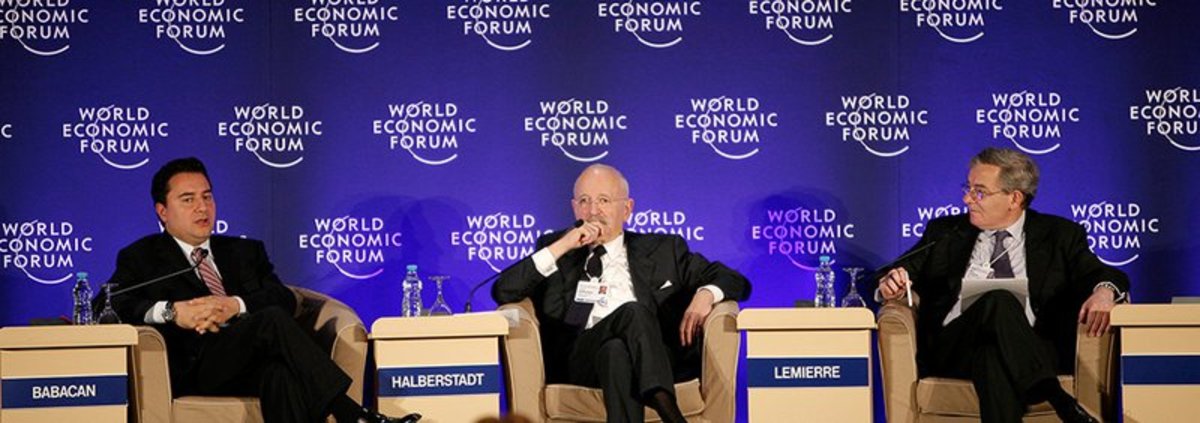
A survey by the World Economic Forum says the tipping point for bitcoin and blockchain adoption will happen by the year 2025.
The majority of 800 executives and experts surveyed by the World Economic Forum
(WEF) put the 6-year-old currency bitcoin, as well as the underlying blockchain technology, 10 percent of the world’s Gross Domestic Product (GDP) running through the two technologies by 2025. The WEF was a bit more cautious with its own prediction and put 2027 as year they would reach the “tipping point.”
The WEF described the use of apps such as Smartcontracts.com, a website that allows people to issue programmable contracts that pay out sums of bitcoin when certain factors (set by the creator of the contract) are reached and verified, without the involvement of any middleman, as a “Shift In Action” in society. “These contracts are secured in the blockchain as “self-executing contractual states,” which eliminate the risk of relying on others to follow through on their commitments.”
“[By 2025] 58 of respondents expected this tipping point to have occurred. Bitcoin and digital currencies are based on the idea of a distributed trust mechanism called the 'blockchain,' a way of keeping track of trusted transactions in a distributed fashion. Currently, the total worth of bitcoin in the blockchain is around $20 billion, or about 0.025 of global GDP of around $80 trillion,” read the report.
Positive impacts of bitcoin and blockchain technology reaching a critical tipping point listed by the WEF included: more direct financial transactions with less and less middleman; brand new assets that can be traded; better property records, and more financial inclusion in emerging markets; blockchain-based contacts and legal services used as unbreakable escrow or programmatically designed smart contracts; and increased transparency.
Technological Shifts that Will Change the Future
World Economic Forum’s Global Agenda Council on the Future of Software and Society gathered to identify 21 changes in society caused by software that would shape the future. They then survey business and technological leaders about when the “tipping point” for these technologies would happen and what the possible positive and negative effects of them would be, and published the results in a report titled Deep Shift: Technology Tipping Points and Societal Impact
.
The committee featured 18 thought leaders and executives in the technology industry, which included several familiar, or involved, in the bitcoin/blockchain industry. Ron Cao, managing director of Lightspeed Venture Partners, a venture firm that invested in American bitcoin exchange CirclePay and Chinese exchange BTCC (formly BTC China); Primavera De Filippi, research fellow at Berkman Center for Internet & Society, France, and early explorer of bitcoin’s and blockchain’s effect on modern law, among others.
The report also included the “sharing economy,” 3D printing, smart cities, wearable devices, the Internet of Things (IoT), among the list of future-shaping technologies.
“Now comes the second machine age. Computers and other digital advances are doing for mental power – the ability to use our brains to understand and shape our environments – what the steam engine and its descendants did for muscle power,” wrote Council Vice-Chair and Director at MIT Initiative on the Digital Economy at Massachusetts Institute of Technology Erik Brynjolfsson in the report.
Blockchain use by governments was another trend that was included in the list. Possible uses by governments included recording land registries, tax collecting schemes, and other improvements in governmental processes. The tipping point decided by the WEF was the first time that tax is collected through a blockchain application and expected it to happen by 2023.
“[By 2025] 73 of respondents expected this tipping point to have occurred. The blockchain creates both opportunities and challenges for countries. On the one hand, it is unregulated and not overseen by any central bank, meaning less control over monetary policy. On the other hand, it creates the ability for new taxing mechanisms to be built into the blockchain itself (e.g. a small transaction tax).”
The WEF remained neutral on whether this would be a net positive or negative, citing corruption, real-time taxation, and unclear role for government in the process, including a state’s central bank, were reasons it could “cut both ways.”
An example given by the report as already underway was a 2016 mayoral candidate of London who has suggested implementing blockchain technology to upgrade the city’s’ ledger for land, as well as for its finances and budget. (Similar experiments are going on in Honduras and the Isle of Man.) “Because these records are kept permanently, there is a strong possibility (without the blockchain) for them to be altered or faulted.”
“The Internet is driving a shift towards networks and platform-based social and economic models. Assets can be shared, creating not just new efficiencies but also whole new business models and opportunities for social self-organization. The blockchain, an emerging technology, replaces the need for third-party institutions to provide trust for financial, contract and voting activities,” concluded the report.
Photo World Economic Forum










